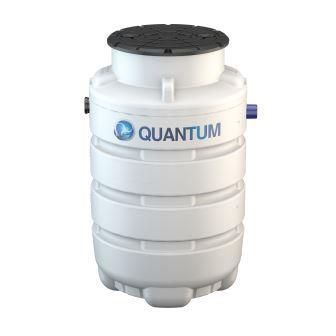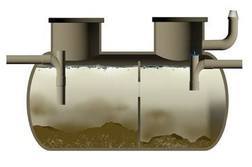What is a Septic Tank?
A traditional septic tank, usually either made of concrete, or bricks, has 2 chambers, Drains from the house discharge into the first chamber through a 'T' pipe. The solids settle to the bottom and form a sludge, whilst fats float to the top and form a thick crust, which helps to keep the smell down.
As sewage enters the first chamber, an equal amout of effluent passes throgh a baffle (usually an 'H' pipe) into the second chamber, where further settlement occurs.
The partially treated, though still very polluting final effluent then passes through another 'T' pipe into the outlet drain, which goes to a drainage field underground.
Modern septic tanks are often made from glass fibre or plastic, but use the same principle s for the partial treatment.
Only foul drains from the toilet, bath, washing machines, etc. must be piped into the septic tank as rainwater is not allowed.
Is Your Septic Tank Legal? - New Regulations
For septic tanks, the UK Environment Agency, in the General BInding Rules, requires all existing septic tanks that discharge, either intentionally, or by accident into a ditch or watercourse, to be replaced by a sewage treatment plant as soon as possible. It is also required if and when you sell your property. Failure to comply will result in Prosecution. They are also not allowed in Groundwater Source Protection Zones or in Flood Plains. Other wastewater treatment systems must be used.
All septic system installations must conform with the Environment Agency General Binding Rules.
What is the Answer?
If you have a watercourse or ditch that you have access to, then the cheapest solution is to replace the Septic Tank with a Sewage Treatment Plant or a septic tank conversion tank which is installed after it. It is much less expensive and less disruptive than installing a new Soakaway Drainage Field and over 70% of sites cannot have one anyway, due to failing the Mandatory Soakaway Drainage Field Tests.
Sewage treatment plants do not need an expensive soakaway drainage field, as they can legally discharge directly to a ditch, stream or surface water drain.
Septic Tank surveys and Reports for homebuyers
If you are buying a house with a septic tank, then a specialist septic tank survey is essential to make sure that it conforms to the General Binding Rules.
Most people with existing septic tanks do not know about the new regulations. They only come to light when they are trying to sell their house and the buyer's Solicitor insists on a septic tank survey to check the legality of the system. Most of these septic tank systems fail the surveys and the seller is faced with a large bill to replace it with a sewage treatment plant.
It is also important to confirm that it meets the Building Regulations Section H2 and BS 6297 2007.
Solicitors also require the vendor to show the status and location of the septic tank and drainage field but many vendors know very little about their system.
Over 50% of septic tank systems fail the surveys and the buyers have to find alterative methods of sanitation, which is not always possible.
If you are buying a house with a septic tank, ALWAYS have an independent specialist septic tank and drainage survey done before purchase. It can save you a lot of grief and money later.

Septic Tank Conversion Units
Septic tank conversion units are add-on tanks that convert septic systems into full sewage treatment systems. The treated effluent can then discharge to a watercourse and make your septic tank discharge legal.
WTE manufactures 3 different types of septic tank conversion units, all of which have full BS EN12566-6 certification. The VORTEX and QUANTUM are full sewage treatment plants in their own right, that can also be added after the septic tank, in order to treat the effluent. The FilterPod is also an add-on unit, but it does not use any electricity..
VORTEX septic tank conversion unit
QUANTUM septic tank conversion unit
FilterPod non-electric sewage treatment plant and septic tank conversion

Drain-X Septic Tank Filters for Protection of the Soakaway Drainage Field
These are placed in the vertical part of the 'T' pipe inside the tank at the outlet end. They prevent small solids, hair, lint, etc. from exiting the tank and blocking or clogging the soakaway drainage field.
It is estimated that they reduce suspended solids in the final effluent by around 60%.
Drain-X septic tank filters are available here:

Septic Tank Permits and Exemptions
These have been replaced for small dischage amounts by the General Binding Rules for small wastewater discharges. They are only required for certain sites or larger populations which discharge over 2 cubic metres/day to ground, which is the amount produced by 13 people.
Wales and Scotland still require registration. See Natural Resources Wales Registration Form Download
Septic Tank Products
We no longer make septic tanks, as new or replacement ones are not allowed in the vast majority of areas in the UK. This is due to the land having high water tables, clay soils or being in a Groundwater Source Protection Zone. These zones are to protect public drinking water, abstracted from boreholes, from becoming polluted with viruses and bacteria from sewage effluent.
Telephone us to check in your area.

Septic Tank Information Pages on this site
Sewage treatment options - All the options for the treatment and disposal of sewage.
Septic tank design - How they work.
Septic tank problems - Typical problems with the tank systems and soakaways.
Septic Tank inspections and Surveys.
Soakaway Drainage Fields - How to design and install a soakaway drainage field.
SODIUM - Its role in soakaway failure.
Septic tank care and maintenance - How to look after your tank.
Septic tank emptying - How to find out if your tank needs emptying.
Septic Tank Dangers - learn the dangers.
Why soakaway crates and tunnels are not allowed for sewage effluent soakaways
Above ground mound soakaway systems for clay and high water table sites
